Law & Politics
Icelandic Fishing Giant Wins Copyright Case Against Artist
The legal dispute has pitted an artist's freedom of expression over a corporation's intellectual property.
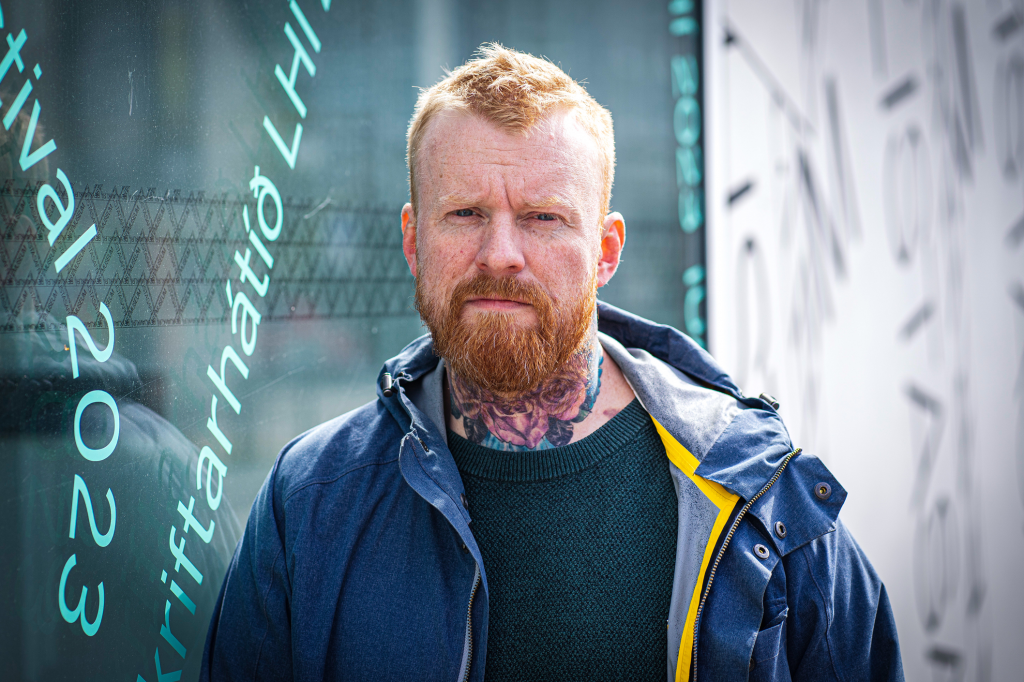
The legal dispute has pitted an artist's freedom of expression over a corporation's intellectual property.

Jo Lawson-Tancred

A London high court has ruled in favor of an Icelandic fishing corporation in its lawsuit brought against an artist who created a conceptual artwork based on the company’s website.
The work by the artist known as Odee had publicly impersonated Iceland’s biggest fishing company Samherji, issuing a fake apology for its role in the so-called “fishrot” corruption scandal of 2019. In his ruling, the judge described the artwork as “an instrument of fraud, copyright infringement, and malicious falsehood.”
The case never went to trial but the artist said he plans to appeal the judgement. His defenders have argued that any punitive action taken against him could result in a “chilling effect” that discourages artists from daring to critique big corporations for fear of legal action.
Samherji sued Odee, the moniker for 41-year-old Icelandic artist Oddur Fridriksson, over We’re Sorry (2023), for which Odee created the website samherji.co.uk, imitating the company’s brand identity. On this platform, he issued the statement: “Samherji Apologizes, Pledges Restitution and Cooperation with Authorities.”
In Samherji’s complaint filed in London’s high court, it accused Odee of trademark infringement and malicious falsehood. The company’s lawyers applied for a summary judgement to avoid a trial.
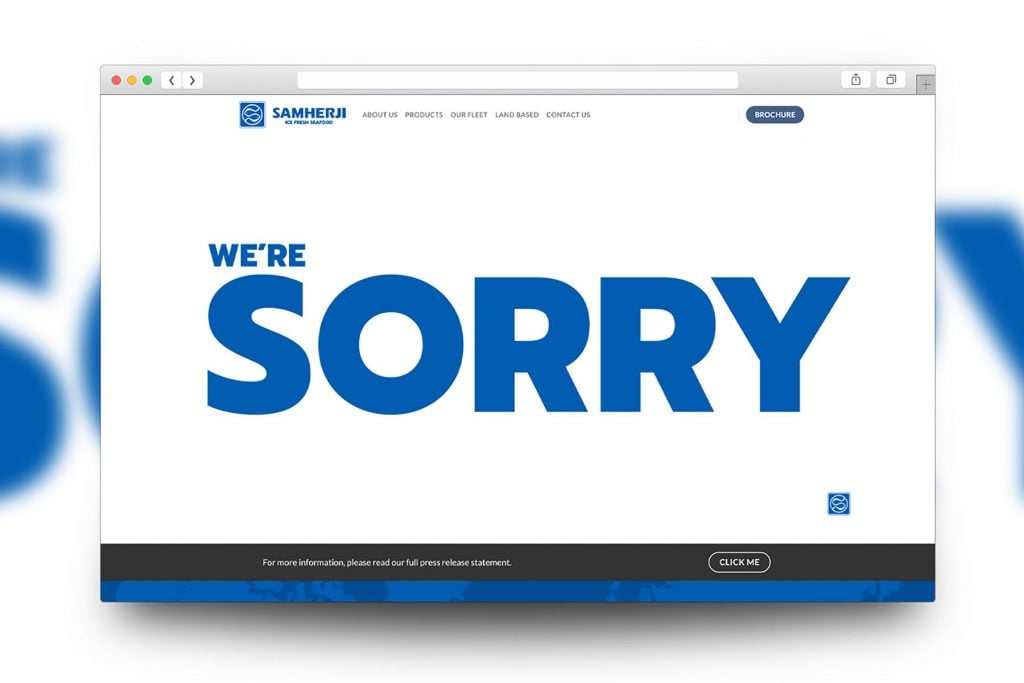
Odee, We’re Sorry (2023). Image courtesy of Odee Friðriksson.
In a ruling filed today, Judge Paul Teverson outlined the reasons why he believes Odee had “no real prospect at trial of successfully defending” himself, his principal defense being freedom of expression.
“The whole design of the Website was intended to make it appear to be the official website of the Claimant,” he wrote. “Parody must evoke an existing work but be noticeably different from the original and constitute an expression of humor or mockery.”
The judge also said that the fake press release, “even if viewed in the context of a work of performance art, contained admissions of a very serious nature” and were presented as admissions made by Samherji. “This ploy or hoax was not in accordance with the ethics of journalism whose principles must apply to others who engage in public debate,” he said.
Odee also has no realistic hope of legally retaining the domain name or opposing a court-ordered interim injunction preventing him from using Samherji’s branding to impersonate the company online, according to Teverson
The question of damages will be settled at a hearing in December. Teverson expressed a “strong inclination” to grant an injunction and advised against a large financial penalty.
Thorsteinn Már Baldvinsson, the CEO of Samherji, said in a statement that he was satisfied with the judge’s ruling today, adding that it “clearly distinguishes between legitimate artistic expression and the misuse of a registered trademark.”
“We are up against corporations with millions and millions of dollars and legal systems that have historically not paid attention to the crucial role that artists, such as Odee, play in the strengthening of democracies,” said Andra Matei, of Avant-Garde Lawyers, who has offered over 500 hours of pro-bono legal support to defend Odee. “While we are disappointed, this decision has only furthered our resolve to take this fight all the way to the very end.”
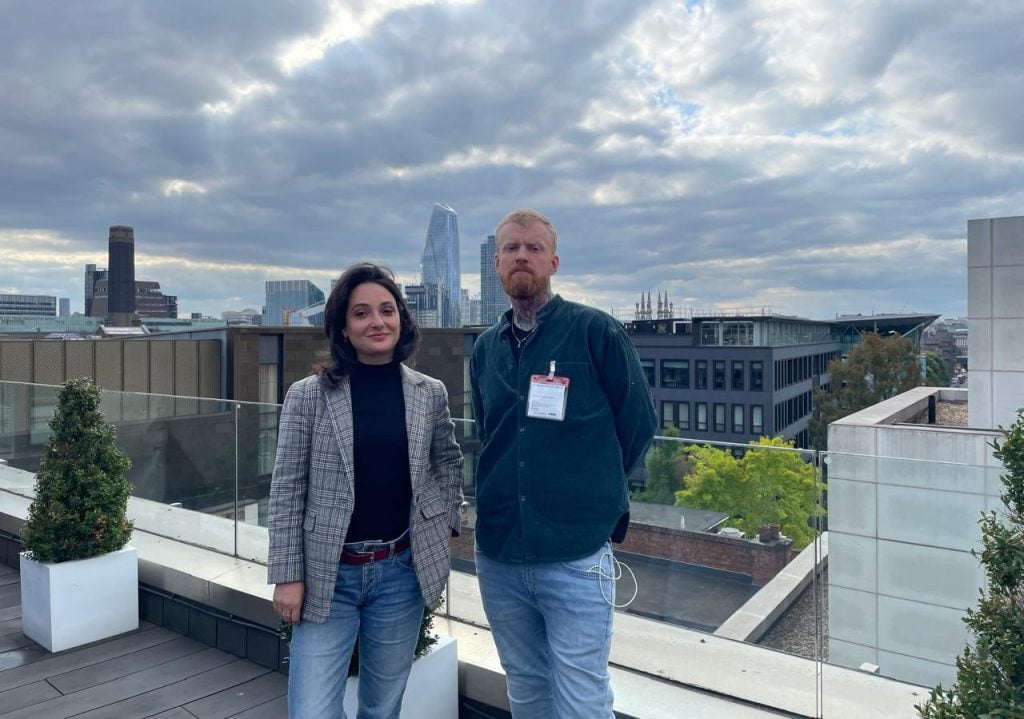
Andra Matei and Odee in London. Photo courtesy of Odee Friðriksson.
The fake apology in We’re Sorry referred to the fishrot corruption scandal, which came to light in 2019 after documents were released on WikiLeaks in which Samherji allegedly bribed officials in Namibia in exchange for coveted trawling rights.
“We admit to using facilitation fees to enable corrupt financial transactions, extracting profits from Namibia and paying mineral taxes,” the fake apology read. “We also concede that we have illegally benefited from mackerel quotas which led to job losses and long-lasting damage to the Namibian economy.”
The fake apology was sent out as a press release to around 100 publications in 20 countries and the same text was exhibited at the Reykjavik Art Museum as part of the artist’s degree show upon graduating from the Iceland University of the Arts.
Odee has previously made works spoofing the budget airline WOW Air and Starbucks, but targeted Samherji because he felt that it had not been brought to justice despite the fishrot scandal being covered extensively in local and global media.
“I felt it had sailed under the radar and people stopped talking about it,” Odee said. “It’s painfully obvious to everyone, except for the company itself, that an apology and offer of restitution and cooperation with the authorities was something that was needed.”
Though he realized the work might result in legal action, he said he has been threatened before and wasn’t worried. “A long time ago, I decided that I’m an artist and I create art,” he said. “The law is for lawyers to figure out.”
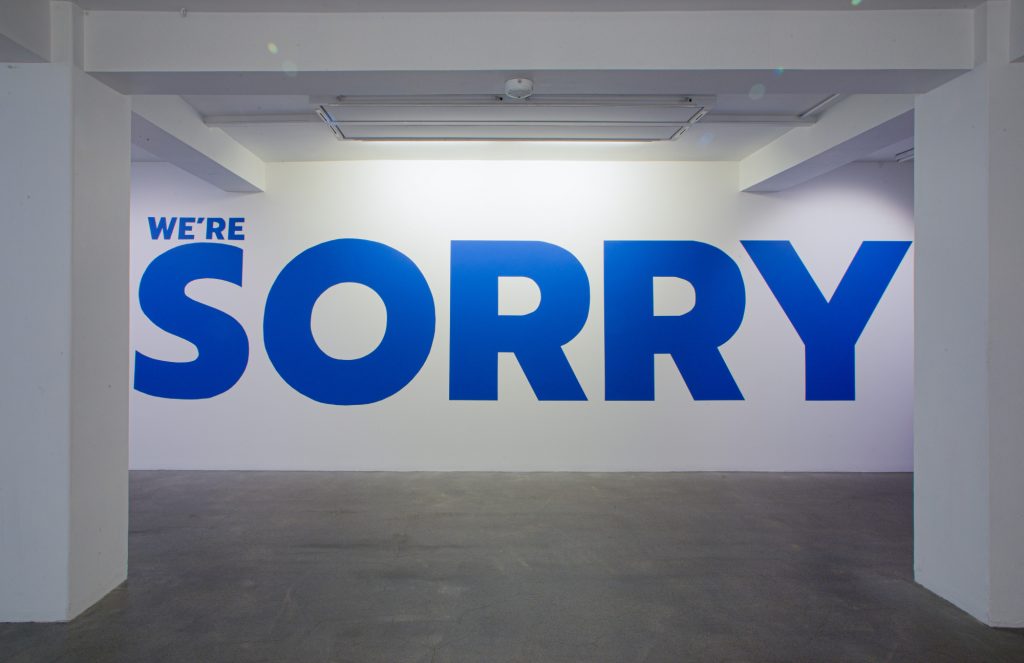
Mural of Odee’s We’re Sorry (2023) at Reykjavik Art Museum in 2023. Photo courtesy of Odee Friðriksson.
The artist claimed that, at a hearing at London’s high court in late September, the fishing corporation’s lawyers “tried to define art for the judge by reading out of the Oxford dictionary, and followed that by saying my art was deprived of human creativity and beauty. This is quite comical because it’s based on their own website.”
“Art was on trial,” he added.
Ironically, Samherji’s decision to sue Odee has brought much greater international attention to the fishrot scandal. He perceives the corporation as being “a very willing participant in the creation of this artwork.”
“This is a living sculpture, a dynamic conceptual piece that lives in the social sphere, in the minds of people, and the conversations that happen online and between people,” he explained. “This case adds to the artistic and societal value of the artwork, which is arguably one of the most famous contemporary Icelandic artworks at the moment.”
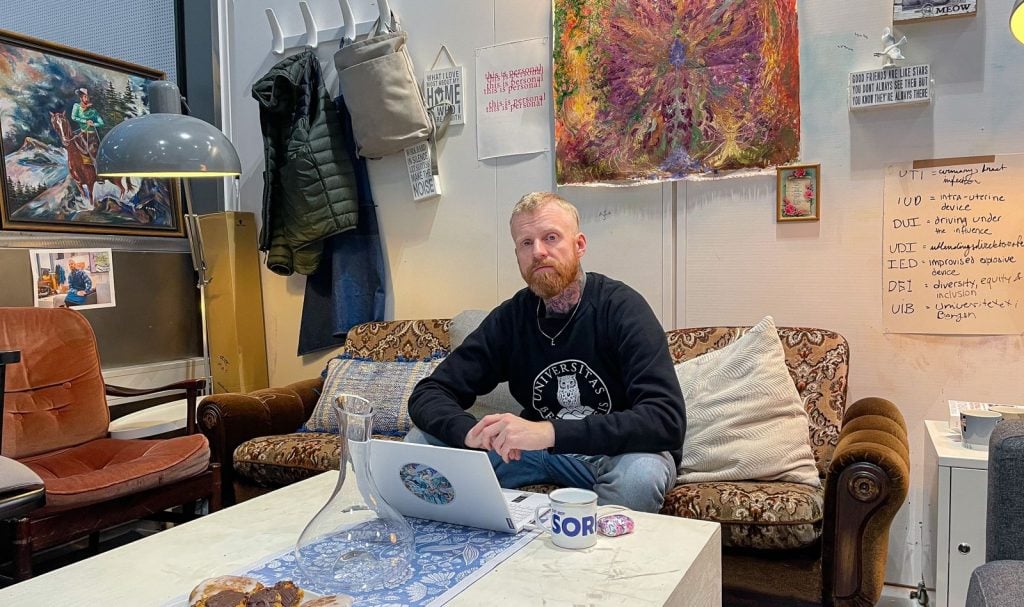
Artist Odee in his studio. Photo courtesy of Odee Friðriksson.
So was he hoping to push the piece forward with a very public, headline-grabbing trial? “The artwork has its own life and I’m indifferent on where it lands,” he claimed. “I throw the dice and we see how they land.”
The decision to pursue legal action at a London high court has been perceived by Odee and his supporters as an attempt to disadvantage the artist. He described the move as “forum shopping,” adding: “If this would have been pursued in Iceland, I would have had the right to an attorney provided by the Icelandic government. They know that I’m disadvantaged financially pursuing a case in another country.”
The domain “.co.uk” also located the action within the United Kingdom and major U.K. publications including the BBC, the Guardian, and the Daily Mail were sent fake press releases by Odee as part of the artwork.
Many artists, including The Yes Men, Nadia Plesner, and Ragnar Kjartansson, have publicly supported Odee, as have organizations such as the Federation of Icelandic Artists, the Association of Icelandic Visual Artists, the University of Bergen, and more than 25 leading whistleblowing and free expression organizations.